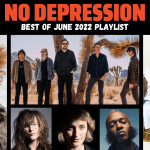A Conversation with Walt Wilkins
Walt Wilkins joined me on the phone recently from his home in Austin, on a particularly beautiful day in a city that seems to have no shortage of them. I wanted to talk to him about a recent comment he made in an online video compelling young songwriters to write better songs, but I got a lot more.
What drives you to write songs?
I was born a writer, and I don’t know why that is. I come from a family of readers, everyone read growing up. I started writing poems when I was 7 or 8, wrote plays, and have always written. No real way to explain it. I don’t know why songs became an innate thing for me, except that my dad had a cool record collection, and there was always music playing.
Who were some of the writers and songs that stuck out to you early on?
My dad was a big Glen Campbell fan, and had all of those Columbia records from the 60s, with all those great Jimmy Webb songs that were produced by Al De Lory. They were in California, and it was such a wide open time. He was a country boy — great guitar player, incredible singer — and he picked out the greatest songs. Those songs really hold up, though the productions were spare. Those records had a profound impact on me as an 8, 9, 10 year old boy.
Some call Jimmy Webb the “king of melody”.
Ha — absolutely. Some of the lyrics I could question, but melodically, he was on a different planet.
Who helped you develop your own style?
I was fortunate to live in Austin a little later on — 12, 13, 14 — another wide open atmosphere. My folks were really cool about taking me to see shows and stuff, and we would see Michael Martin Murphey, Jerry Jeff, Rusty Wier. Those guys were all around and were even getting signed — Steve Fromholz was on Capitol for a while. Those are my heroes — now, I look back and I can see the connection — I always thought that being a songwriter was a very natural and viable thing.
When did you start pursuing songwriting as a full time thing?
Full-time, I was 32. I started keeping songs when I was 24. That’s when I wrote something and said “alright, this is a song”. I’ll play this. Then I kept at it, kept writing, didn’t quit, and hit the road when I had a couple of dozen songs, a dozen of which were pretty good.
Is it a confidence thing? What makes you know that a song of your own is good?
I was lucky enough — the Glen Campbell influence, I also heard the Nashville guys — Harlan Howard, all the Bob Wills records. I grew up around great songs. I wouldn’t have had much of an excuse if it was bad. Not that I haven’t written bad songs — I have tons of bad songs that I hope no one ever hears. I had good models before I could even drive.
When did you go to Nashville?
I got a call from a publisher that said you should come over here. I didn’t want to at first, but I visited, went back and forth, and after about a year, I quit my job and moved. A bunch of the greatest songwriters in the world, and a whole bunch of the greatest musicians live there. I don’t think it formed me, I had a sense of what the rules were. I did learn to write with a lot of people, even with a bunch of my heroes. I wrote a lot of songs there, ones that I still sing all the time.
And then back to Texas?
Came back home — it’ll be 8 years this week. I gotta check on the calendar, but I’m almost sure it was November 18th. I had an entrée in to the scene here through Pat Green. He had cut about 6 of my songs, and we wrote another half dozen that he recorded. I had the blessing and a curse thing of having my name in one of his songs, which definitely helped me out by the time I got back. It was a sweet thing — I could go play and have a few people show up.
How did that “Texas Country” revival affect the music?
I think people took for granted the hard work that the early guys put in. Pat is a great singer, he wrote good, honest songs that people can relate to, and is an incredible performer. They made it look easy — too easy. Cory Morrow is the same way, he can put on a great show. We have these legions of younger guys that grew up in their wake, some of who are great and some of who are…you know.
I won’t make you name names.
I kind of regret saying that on that TV show, even though I do believe its true. It’s really none of my business whether people write better songs or not. It’s a little bit like Nashville ten years ago, when some of the material took a turn south, and everyone knew it. People would talk about it in publishing companies, saying “We have the best songwriters in the world, but not the songs on the radio”. There are some similarities to Texas right now.
To the young songwriters that might be skipping a few steps — what might you say to them?
Write your songs, and go play them for people. See if it moves anyone. See if they stay interested. See if you can make someone laugh. Or cry. That’s the only way to learn. I have no beef with American Idol or any of those shows, but one thing it does is it takes a huge shortcut. There’s something to be said for playing your songs for flesh and bone in a room. It’s a powerful test. See if you have the passion to adjust what needs to be adjusted.
Funny that you mention laughter — his use of humor is what makes Jerry Jeff so interesting to me. It seems that younger writers want to be taken very seriously. How do you develop the nuance to be funny?
It takes working a room — some people have a natural gift for it. Either way, you have to go work it in a room. I’m sure Roger Miller played a thousand rooms before anyone ever heard of him. And plus, he was a genius.
That helps.
Or dance — if you can write a song to tempo and have the right wordplay, it’s just as hard. You have to be able to move people one way or another. This is just all my humble opinion.
Is it important to write bad songs?
They can exist, but they don’t all deserve to be released. All the do-it-yourself stuff has changed commercial recording for the better, and I love it. The old process certainly did away with a lot of the natural checks where someone might go “yeah, I don’t know if this is going to make the record”. There are more chances of a really dumb song getting cut where you might say “why did I release that?”
Sometimes there seems to be a condescending attitude towards songs that are popular. Is it harder for a popular song to be considered a great song?
It does kind of seem that way these days. I don’t know why that is, I really don’t. I have thought about that question a lot — why are so many of the top 10-20-40 songs not the songs we listen to when we want to hear something great. I don’t know. John Prine lives in Nashville — an incredible body of work. One of the greatest writers, poets, philosophers. He doesn’t get cuts anymore, and has had maybe one hit for someone else. Same with Guy Clark. No one is cutting his songs anymore — he never had a ton of cuts, but he had his share. It’s funny — you could have a conversation with a publisher who might say “of course you and I know this song is great, but I don’t think other people will.” I think it underestimates the audience. I like to think that most anyone would like a Guy Clark song. It doesn’t seem like a lot of the radio songs are ones that I would say “play this at my funeral” or “this is how I feel about my wife”.
Does it go the other way? Do great songs get discounted because they are on the radio?
Well, yeah. Look at “The House That Built Me”. Some people felt like they had to justify liking it. There’s a Josh Turner song out now — “Time is Love” — I love that song. I heard a new Keith Urban song that was really driving, really good. I do think we are in an era where these songs might not get played a whole lot in 10 years, that’s probably true. But again, I haven’t been successful enough to broadcast an opinion.
It reminds me of a few years ago when Lori McKenna got several Faith Hill cuts — there seem to be these moments when things align.
Those are golden moments. Her getting that attention real fast — that was cool for everybody. She is a saint, one of my favorite human beings and writers.
What have you heard lately that has struck you?
Two stone cold, old-fashioned country records came out this year. Jason Eady’sAM Country Heaven and Davis Raines’ Santa Maria Hotel. Davis lives in Nashville and has been around a long time. He is one of the greatest living songwriters. People who know his stuff know it. He released two records this year — that one and The Adventures of the Big Boy. Everyone should be hip to Davis Raines. He’s the realest country songwriter I know of.
What would you say about this era of music?
The good thing about this time — since the economy of music changed, people who wanted to make their own records could. Texas had a big impact, in the wake of Pat, Cory, and Ingram. Nashville knows. Aaron Watson has stayed independent the whole time. Those guys built audiences and have worked hard to keep them up. I am a fan, and I love that I am part of the same world that they are. I have a great band now — I can bring them any song and they can play the hell out of it. It fits together.
Seems like everyone is pulling off of the same thread.
I believe strongly in that. Everything is connected. I shouldn’t talk so much about anything, I have no right, but I can be vain and opinionated sometimes.
What is the last great song you heard?
There are so many great songs everywhere. My wife played me a great song that she has nearly finished. [Pauses to think] I’ve made this into a heavy question — I opened for Guy Clark in March at Poor David’s Pub in Dallas and he played two new songs, and they were both incredible. I thought, “this isn’t even fair.”
Hear Walt perform “If It Weren’t For You” at The Song Survives. His latest is Plenty.
Read more recent posts:
Holly Williams – “Drinkin'”
Kacey Musgraves and Trent Dabbs – “Undermine”
Ashley Monroe – “Like a Rose”
Drew Kennedy – “Vapor Trails”




